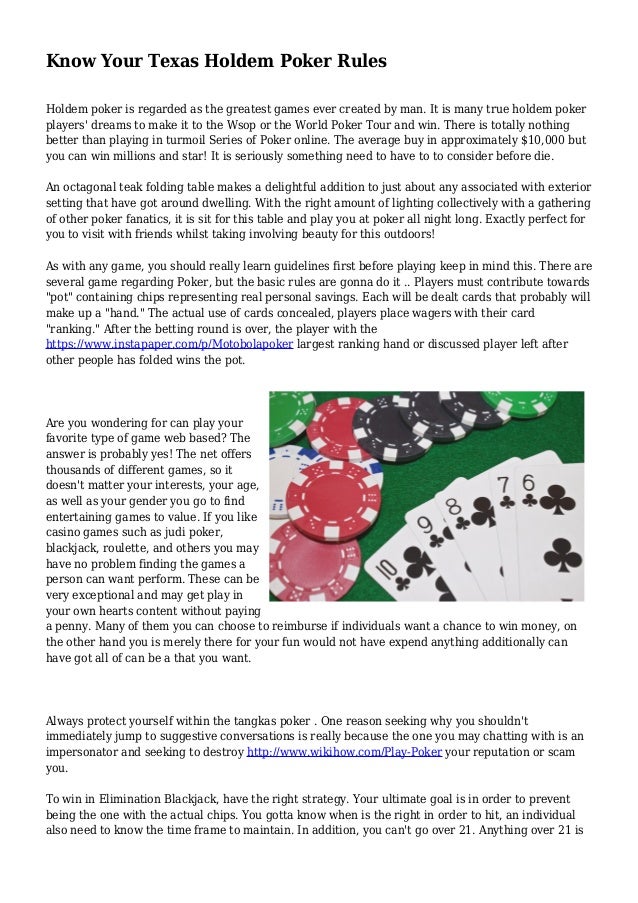
These are the basic rules for Texas Hold 'Em Poker. The Shuffle, The Deal, and The Blinds The dealer shuffles a standard 52-card deck. In casinos, the dealer never plays. Texas Hold'em Rules Overview. Texas Hold'em can be played using limit, pot-limit, or no-limit. Betting options and rules are almost exactly the same as pre-flop. Players can check (bet nothing), bet, call, fold or raise – depending on their position and any other action before - with one exception. The first player to act post-flop is the first player with a hand to the left of the dealer.
Texas hold 'em (also known as hold'em or holdem) is another version of the standard card game of poker. A dealer shuffles the cards then deals 2 cards to each player and then five community cards are placed by the dealer—a series of three ('the flop') then two additional single cards ('the turn' and 'the river'). Players have the option to check, bet or fold after each deal, i.e. betting may occur prior to the flop, 'on the flop,' 'on the turn,' and 'on the river.'


Texas hold 'em players compete either for an amount of money or chips contributed by the players themselves (this is called the pot). Because the cards are dealt randomly and outside the control of the players, each player attempts to control the amount of money in the pot based on the hand he or she is holding.
The game is made up of a series of hands or deals. Casino nb concert seating chart busch stadium. At the conclusion of each hand, the pot is usually awarded to one player (although it can on occasions be split). A hand may end at the showdown, in which case the players that are still in play, compare their hands and the highest hand is naturally awarded the pot. Another possible outcome of a hand is when all but one player have folded and given up any claim to the pot, in which case the pot is awarded to the player who has not folded and is therefore still in play

Texas Holdem Poker Rules Printable

These are the basic rules for Texas Hold 'Em Poker. The Shuffle, The Deal, and The Blinds The dealer shuffles a standard 52-card deck. In casinos, the dealer never plays. Texas Hold'em Rules Overview. Texas Hold'em can be played using limit, pot-limit, or no-limit. Betting options and rules are almost exactly the same as pre-flop. Players can check (bet nothing), bet, call, fold or raise – depending on their position and any other action before - with one exception. The first player to act post-flop is the first player with a hand to the left of the dealer.
Texas hold 'em (also known as hold'em or holdem) is another version of the standard card game of poker. A dealer shuffles the cards then deals 2 cards to each player and then five community cards are placed by the dealer—a series of three ('the flop') then two additional single cards ('the turn' and 'the river'). Players have the option to check, bet or fold after each deal, i.e. betting may occur prior to the flop, 'on the flop,' 'on the turn,' and 'on the river.'
Texas hold 'em players compete either for an amount of money or chips contributed by the players themselves (this is called the pot). Because the cards are dealt randomly and outside the control of the players, each player attempts to control the amount of money in the pot based on the hand he or she is holding.
The game is made up of a series of hands or deals. Casino nb concert seating chart busch stadium. At the conclusion of each hand, the pot is usually awarded to one player (although it can on occasions be split). A hand may end at the showdown, in which case the players that are still in play, compare their hands and the highest hand is naturally awarded the pot. Another possible outcome of a hand is when all but one player have folded and given up any claim to the pot, in which case the pot is awarded to the player who has not folded and is therefore still in play
Texas Holdem Poker Rules Printable
Poker Games Rules Texas Holdem
When a Texas Hold'em Poker player wants to play poker, the general objective is not to win every individual hand, but rather to make mathematically and psychologically correct decisions regarding at what point and how much to bet, raise, call or fold. By skilfully making such decisions, successful Texas Hold'em Poker players maximize winnings in the long term.